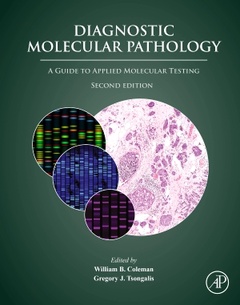Diagnostic Molecular Pathology (2nd Ed.) A Guide to Applied Molecular Testing
Coordonnateurs : Coleman William B., Tsongalis Gregory J.

As it is essential to stay up-to-date on new molecular diagnostics in this changing field, this book covers critically important areas in the practice of personalized medicine and reflects our understanding of the pathology, pathogenesis and pathophysiology of human disease.
Section 1 – Introduction to Molecular Testing 1. Introduction to Molecular Testing in Human Disease 2. The Polymerase Chain Reaction and Other Amplification Methodologies 3. Whole-exome and Whole Genome Sequencing in the Molecular Diagnostic Laboratory 4. Long-read Sequencing
Section 2 – Molecular Testing in Infectious Disease 5. Molecular Testing for Human Immunodeficiency Virus 6. Molecular Testing in Hepatitis Virus-related Disease 7. Molecular Testing for Human Papilloma Viruses 8. Molecular Testing for Parvoviruses 9. Molecular Testing for Polyomaviruses 10. Molecular Testing for Respiratory Viruses 11. Molecular Testing for Diseases Associated with Bacterial Infection 12. Agents Associated with Sexually-transmitted Infections 13. Molecular Methods for Healthcare-Acquired Infections 14. Molecular Testing in Emerging Infectious Diseases 15. Molecular and Serological Testing in the Setting of a Global Pandemic
Section 3 – Molecular Testing in Genetic Disease 16. Non-invasive Prenatal Screening (NIPS) for Fetal Aneuploidies 17. Molecular Testing in Cardiomyopathies 18. Molecular Diagnostics for Coagulopathies 19. Molecular Diagnosis of Cystic Fibrosis 20. Molecular Testing in Hemochromatosis 21. Molecular Testing for Spinal Muscular Atrophy 22. Molecular Testing for Autism Spectrum Disorders
Section 4 – Molecular Testing in Oncology 23. Molecular Testing in Breast Cancer 24. Molecular Testing in Lung Cancer 25. Molecular Testing in Colorectal Cancer 26. Molecular Pathology and Testing in Melanocytic Tumors 27. Molecular Testing for Glioblastoma 28. Molecular Testing in Pancreatic Cancer 29. Molecular Testing in Gynecologic Cancer 30. The Emerging Genetic Landscape in Renal Cell Carcinoma 31. Molecular Testing in Thyroid Cancer 32. Molecular Testing for Pediatric Cancers 33. Molecular Pathogenesis of Soft Tissue and Bone Tumors 34. Molecular Pathology of Gastrointestinal Stromal Tumors 35. Molecular Pathology of Liver Cancer
Section 5 – Molecular Testing in Hematopathology 36. Molecular Testing in Myeloproliferative Neoplasms 37. Molecular Testing in Myelodysplastic Syndromes 38. Molecular Testing in Acute Myeloid Leukemia 39. Molecular Testing in the Assessment of Bone Marrow Transplant Engraftment
Section 6 – Molecular Testing in Personalized Medicine 40. Pharmacogenomics in Cardiovascular Disease 41. Personalized Medicine for Disorders of Hemostasis and Thrombosis 42. Personalized Medicine in Cancer Treatment
Section 7 – The Future of Molecular Testing 43. Imaging Mass Spectroscopy in Clinical Pathology 44. Artificial Intelligence and Deep Learning in Molecular Testing 45. Nanotechnology in Molecular Diagnostics 46. Chip-based Nanotechnology in the Molecular Pathology Laboratory and Beyond 47. Translational and Clinical Applications of the GeoMx® Digital Spatial Profiling Platform
- Includes new material on mass spectrometry for infectious diseases, microbiome, homology-directed repair for PARPi, whole genome sequencing for constitutional testing, and much more
- Provides insights on the value of the molecular test in comparison to traditional methods, which include speed, precision, sensitivity and clinical impacts for the patient
- Focuses on the menu of molecular diagnostic tests available in modern molecular pathology or clinical laboratories that can be applied to disease detection, diagnosis and classification in the clinical workup of a patient
- Explains how molecular tests are utilized to guide the treatment of patients in personalized medicine (guided therapies) and for the prognostication of disease
Date de parution : 10-2023
Ouvrage de 844 p.
21.5x27.6 cm
Mots-clés :
?16S rRNA; 1p/19q; ACMG molecular testing guidelines; ALK; AML classification; Acute myeloid leukemia; Adenovirus; Adult granulosa cell tumor; Antiarrhythmics; Ariosa; Arrhythmogenic cardiomyopathy; Artificial intelligence; Atypical squamous cells undetermined significance; Autism spectrum disorder; Autosomal-dominant; B19V; BK; Bioinformatics; Biomarker discovery; Bleeding; Bleeding and clotting disorders; Blood safety; Bocavirus; Bone; Bone marrow transplant; Breast cancer; CDKN2A/B; CEBPA; CF molecular diagnosis; CFTR; Cancer; Cancer Transcriptome Atlas; Cancer-related death; Carbohydrate antigen; Carney–Stratakis syndrome; Carrier screening; Cell-free fetal DNA; Cervical cancer; Cervical intraepithelial neoplasia; Chimerism; Chlamydia trachomatis; Chromosomal abnormalities; Chromosomal microarray (CMA); Chronic pancreatitis; Classification; Clear-cell pRCC; Clinical evaluation; Clopidogrel; Clostridioides difficile; Clotting; Coagulation; Colorectal cancer; Companion diagnostics; Copy number variation; Cystic fibrosis; Cystic fibrosis transmembrane conductance regulator; Cytogenetic; Cytogenetics; DICER1; DNA; DOG-1; DPCR; DdPCR; Deep learning; Department of Health and Human Services; Detection of therapy-resistant viral mutants; Diabetes; Diagnostic testing; Diagnostic testing toolbox; Digital Spatial Profiler; Dilated cardiomyopathy; Disease; Down syndrome; EGFR; Emerging infectious diseases and emerging pathogens; Emerging platforms; Endometrial stromal sarcoma; Engraftment; Epilepsy; Exon 18 D842V mutations; FLT3; FOXL2; FXI deficiency; Ferroportin; Fluorescence in situ hybridization (FISH); Fluorescence in situ hybridization (FISH) and melanoma immunohistochemistry (IHC); Gastroenteritis; Gastrointestinal stromal tumors; Gene mutation; Gene mutations; Genetic testing; GeoMx; Germline variation and genetic testing; Gestational trophoblastic disease; Glioblastoma; Gonorrhea; Group B Streptococcus; HER2 testing; HFE; Hemochromatosis
